The Republic of Cameroon and the State of Israel have maintained cooperation ties since Cameroon's independence in 1960. Cooperation was temporarily deferred from 1973 (upon the outbreak of the Yom Kippur War), when many African countries suspended bilateral relations with the State of Israel. In 1986, Cameroon was amongst one of the first African countries that renewed diplomatic relations with Israel.
It is well known that Israel is an arid and desert country, whose subsoil hardly abounds in natural and mineral resources. Today Israel ranks among the best performing economies in the world. Two things can explain this: first, the ability of the Israeli people to adapt to their environment and find innovative ways and means to make arid land suitable for agriculture. Second, investment in education and research has led to a highly diversified economy. Education, research, and a culture of innovation are thus fundamental to Israel's success in the world.
In more than half a century, since both countries achieved independence, Cameroon has developed a promising economy around agriculture while Israel has invested in education to develop a strong Hi-Tech culture and industrialization. Moreover, Cameroon's desire to diversify its economy serves a priceless opportunity for further cooperation. The ground is fertile for such cooperation: the basic infrastructure necessary for the development of a diversified economy is booming, the population, especially youths, are keen on technology, and several solutions have already emerged and that have put Cameroon on the map of reference countries in Central Africa.
Israel and Cameroon share a long history of excellent bilateral relations, and cooperation in the fields of agriculture, health, education and cultural exchanges; and although it is difficult to make an excellent relationship better, there is a lot of potential for both parties to reinforce the content of their cooperation through knowledge sharing in various field such as Education where Israel has already contributed significantly.
In 1986, Ambassador of Israel in Cameroon HE. Gadi Golan, said ‘‘Cameroon and Israel are jointly involved in a human scale adventure. They are implementing direct and practical cooperation in accordance with the needs of the century now drawing to a close and which has brought about such profound changes in all spheres’’.
In August 1986 Prime Minister Shimon Peres flew to Yaounde, on a mission that would result in the restoration of diplomatic ties between Israel and Cameroon. He was also carrying on his plane emergency medical equipment and personnel badly needed to help the victims of a disastrous volcanic gas eruption that just a few days before had killed and injured thousands of Cameroonians.
In June 17, 1987, ten months after the visit of his predecessor Prime Minister Peres, Prime Minister Yitzhak Shamir and his wife Shulamit Shamir visited Cameroon. The visit, described as very successful by political analysts, ended as Israel and Cameroon move into higher gears in higly intense relations relaunched ten months ago.
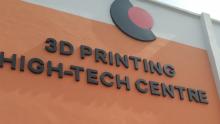
The Hi-Tech Centre inaugurated in 2012 at the National Polytechnic School of Yaoundé is one of the flagship projects of the Israeli Embassy. It is a modern Centre that trains students from all over Africa in industrial electricity systems, robotics and mechatronics systems. In 2017, a 3D printing department was created next to the Hi-Tech Centre with a view to completing the High Technology training offer; thus, making the Polytechnic School of Yaoundé, a unique and most advanced Centre of its kind in Africa. In addition, the revolutionary technology of 3D printing contributes significantly to the modernization of Cameroonian industry (for example, by allowing the local printing of prototypes designed abroad), and medical treatments (for example, by producing individual prosthetic implants and artificial limbs);
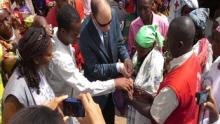
In June 2014, the Israeli Embassy in collaboration with SOCAPED provided aid to refugees in the Gado-Badzara camp (Eastern Cameroon region), and vaccinated more than 5,000 children against polio and measles. That year in September, Israel helped Cameroon in its efforts to prevent Ebola, two Israeli doctors trained more than 100 medical personnel in hospitals in Yaounde. In December 2014, two Israeli coaches from the MIFALOT organization organized soccer activities for more than 2500 young refugee boys and girls from the Central African Republic to encourage coexistence with the host community.
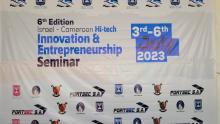
From December 2016 to July 2023, six seminars on innovation and entrepreneurship have already been organized by the Israeli embassy in Yaounde. Besides the seminars, the Embassy also supports the development of a proactive entrepreneurial ecosystem through assistance of avant-garde incubators and entrepreneurship training networks.
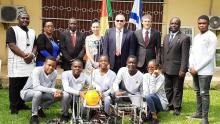
Since 2017 the Embassy supported a new initiative launched by the Tassah Academy aimed at promoting science, Technology, Engineering and Mathematics (STEM). The initiative: “Maths competition” rewards the best performing pupils in science and mathematics in primary schools in the Yaounde area. Donation of 3-D printing equipment to NexGen Academy also promoted by Mrs. Fofang. Support and donation for Cameroon team in World robotics competition lead by students from these schools.
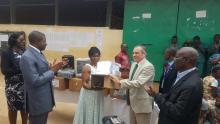
The embassy donated computer equipment to CETIC Ngoa Ekelle and Lycée d’Étoug-Ébé. The same activity was repeated in 2020 with the donation of computer equipment to the Obala Audiovisual and Journalism School promoted by Mr. Bineli Georges. Also, the handing over of Braille equipment to the Christian Blind Mission, CBM, for the design of teaching aids for handicapped and visually impaired children of PROHANDICAM School (the old machine used to translate texts into Braille was completely obsolete).
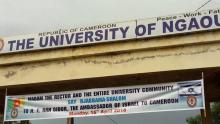
The financing of the video-conference Centre of the University of Ngaoundere, allowing students to follow online lectures offered by eminent Israeli academics. And the support for the opening of the first coding school in Cameroon in partnership with ''Developers. Institute’’ in Israel (2019).
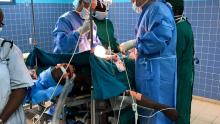
Training of Emergency surgeons. Ten of Israel's best surgeons were brought to Cameroon for a one-week workshop to train 50 Cameroonian surgeons. The training was repeated with a second edition in 2020 and had the same excellent results as the first one.
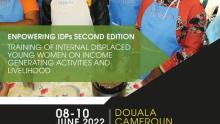
From November 2021 to December 2022, Training of Internal Displaced young women on income generating activities and livelihood (three editions were organized, in the Littoral (Douala), Centre (Yaoundé), and East (Bertoua) regions.
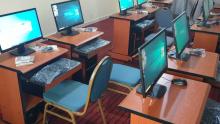
From 2022 to 2023, The computer Centres project has already been implemented in four regions of Cameroon (Yaounde, Bafoussam, Abong-Mbang, and Kribi) with four rooms equipped with 15 computers each.
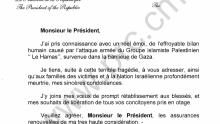
Following the appalling Hamas attack on October 7, 2023, the President of the Republic of Cameroon expressed his condolences to the Israeli people and wished for the release of all hostages.
